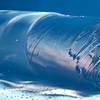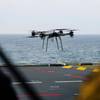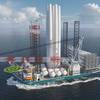M. Ship Launches Experimental Vessel
The M80 Stiletto initiative is part of OFT's Wolf PAC Distributed Operations Experiment, conducted in association with USSOCOM, to explore command and control of geographically dispersed, but networked, autonomous and semi-autonomous military forces. This new concept of operations by the Department of Defense is in response to diffuse threats that are perceived as emerging in the future.
The M-80 Stiletto and Wolf PAC operational experiment was USN (ret) Vice Admiral Arthur Cebrowski's vision for a more adaptive force using high numbers of smaller, faster networked vessels designed for littoral, or near shore, waters and costing less to build than conventional ships, said Cmdr. Gregory Glaros, Stiletto's project lead and a military transformation strategist who worked for Cebrowski. Cebrowski died last November, but the new Navy Expeditionary Combat Command (NECC), announced in January 2006, is, in effect, implementing the vice admiral's vision for expeditionary combat in the 21st century, said Glaros.
"We are confident that the M80 Stiletto's design is superior to all other existing technologies. Nothing else is out there than can achieve the qualities important to brown water vessels at a relatively low cost with short design and production cycles," said Chuck Robinson, co-founder of San Diego-based M Ship Co. and a former deputy secretary of state with Henry Kissinger.
The 88-ft. long vessel features M Ship Co.'s patented M-shaped hull that provides a stable yet fast platform for mounting electronic surveillance equipment or weapons, or for conducting special operations. The hull design does not require foils or lifting devices to achieve a smooth ride at high speeds in rough conditions. Its shallow draft means the M-80 Stiletto can operate in riverine environments and potentially allows for beach landings. The fuel-efficient M-80 Stiletto is equipped with four Caterpillar engines, yielding a top speed in excess of 50 knots (nearly 60 miles per hour) when fully loaded and can be outfitted with jet drives for shallow water operations and beaching.
"The M-hull form creates a natural surface effect that not only enhances top-speed performance, but uses the bow wave energy to reduce the overall wake signature," said Bill Burns, co-founder of M Ship Co., noting that the military is also interested in 40- and 120-foot vessels of similar design. "This makes the boat faster and more maneuverable because it remains flat, with almost no heeling, even during high-speed turns. The vessel's proprietary design also gives it a low-radar profile."
The M-80 Stiletto is also notable because it is the largest U.S. Naval vessel built using carbon fiber composite and epoxy building techniques, which yields a very light, but strong hull.
M Ship Co. leveraged its network of collaborative partners and subcontractors to build the M80 Stiletto in less than one year. Azimuth Inc. developed the vessel's "electronic keel" -- a maritime data bus for networked plug and play of emerging technologies such as communications, surveillance and weapons systems. SP Systems provided the carbon fiber technology for the composite hull. The vessel was built by National City-based Knight & Carver YachtCenter.
M Ship Co. is in discussions with several major defense contractors to capitalize on the success of the M-hull technology for the emerging military market for vessels that can operate in alignment with the NECC's new focus on "brown water" operations.










